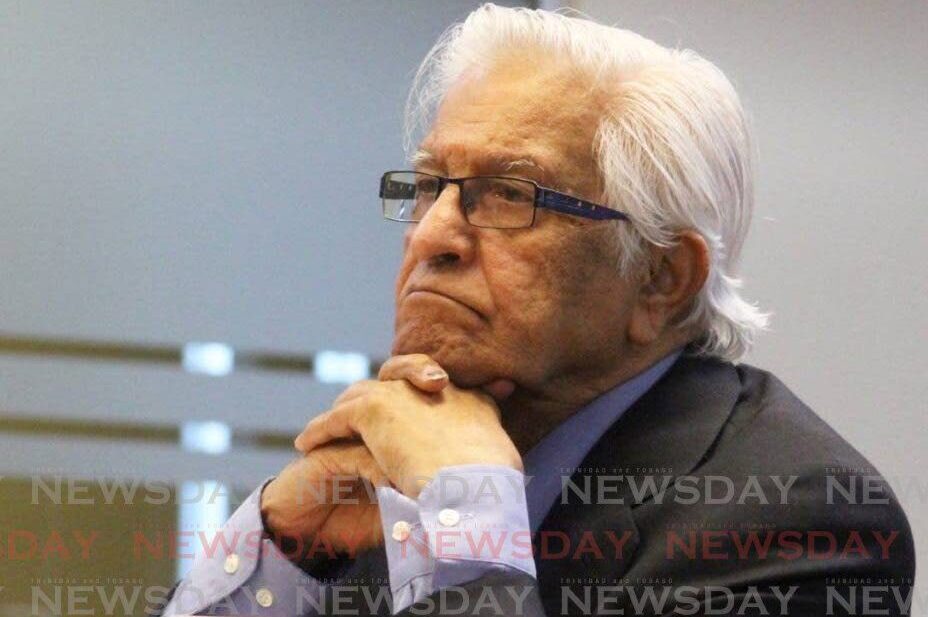Top policies introduced under Basdeo Panday's administration

AS the country continues to mourn former prime minister Basdeo Panday, many are praising him for "life-changing" policies implemented under his administration. He was prime minister from 1995-2001. He died on Monday at age 90.
Here are a few policy changes implemented under his leadership:
Arrival Day becomes Indian Arrival Day:
Panday decided the May 30 holiday Arrival Day, which commemorated the arrival of East Indians in TT, should be called Indian Arrival Day.
In a press release on Tuesday, president of the National Council of Indian Culture Sen Deoroop Teemal said he was "deeply saddened" by the news of Panday's death.
"Words seem inadequate to express the depth of sorrow felt by all who admired his remarkable leadership and unwavering dedication to TT and world politics," he said.
He added that Panday's "indelible mark" on TT's history and "unwavering commitment" to the betterment of his people will always be remembered.
"The National Council of Indian Culture has had a longstanding relationship with this colossal gentleman in and out of politics. His contribution to the political landscape will be greatly missed. "May his spirit continue to inspire generations to come, and may his family and loved ones find solace in the outpouring of love and support during this difficult time."
Education – abolishing Common Entrance, dollar-for-dollar initiative:
Panday felt the Common Entrance exam was preventing many from being able to achieve a secondary-level education owing to difficulty. If a primary school student did not reach achieve specific grades, despite passing the exam, they were not allowed to advance to secondary school. The Panday administration recognised these challenges and replaced the exam with the Secondary Entrance Assessment (SEA).
When it came to tertiary education, he also introduced the dollar-for-dollar initiative which required students to only pay 50 per cent of their school fees, while the government covered the next 50 per cent.
TT Unified Teachers Association (TTUTA) president Martin Lum Kin said the union takes note of all the policies Panday made towards education.
"We appreciate his efforts and the impact he would have had on education in TT. His influence will continue to bear fruit in the education system of TT."
Holiday, land for Spiritual Baptists:
Panday officially declared March 30 as Spiritual/Shouter Baptist Liberation Day and also 25 acres of land in Maloney to build schools, churches, etc.
Spiritual Baptist Archbishop Barbara Burke told Newsday her community lost their "great shepherd."
Burke said Panday "helped us to reach where all other denominational (groups) reach because we had nothing. So there is grief in our hearts."
She said once funeral arrangements are disclosed, the Spiritual Baptist community will attend in their numbers.
"To me, he was a god-fearing man, a man of peace, a man of love. When I went before him and put my cry before him, he was very sympathetic to me. We are eternally grateful to him as he showed us love and appreciation."
Panday, she said, was the first politician to take the Spiritual Baptist community seriously and actually listen to their concerns.
Gray-Burke also served as a government senator under the Panday administration.
No more corporal punishment in schools
In 2001, Opposition Leader Kamla Persad-Bissessar – who was education minister at the time – piloted legislation to ban corporal punishment in schools under the Panday administration.
"Spare the rod and spoil the child is an old adage that should stay in the archives, not in schools," Persad-Bissessar had said in announcing the government's plans.
E-999 (emergency telephone) system, Highway Patrol
Both of these units of the police service were implemented under Panday's administration. In 2007, he recalled his stance as prime minister being that crime can be tackled by micro-managing the security system. Referring to both of the units, he had said, “It is not a difficulty to solve crime but you need a little brains and guts, and have to work hard and be a hard task master. This is not pie-in-the-sky but what I actually did.”
Removal of taxes on importing foreign-used cars:
There were many hurdles to overcome to become a car owner in TT. This included but was not limited to having to pay bribes as there were very few assembly plants. In addition to this, there were restrictions on importing foreign-used cars.
In a 2022 interview with the TT Automotive Dealers Association, Panday had said when he came into office, there were only two assembly plants.
"...And in order to promote these assembly plants and make them profitable, the (previous) government had implemented severe restrictions of the importation of foreign-used cards. That created a monopoly for the people that were assembling and they began taking advantage of the public.
"One firm actually wanted $5,000 to merely put your name on the (waiting) list, which was a long list, just in order to get to own a car somewhere way down the road."
TTADA president Visham Babwah told Newsday that Panday's decision helped benefit the entire country "in terms of the redistribution of wealth in the automotive industry."
Recalling the decision not being popular among the elite, he said Panday held his ground.
"He was one of a kind. I don't think we will ever see a leader like Mr Panday in this country ever again. He fought all his life for the benefit of the lower class."


Comments
"Top policies introduced under Basdeo Panday’s administration"